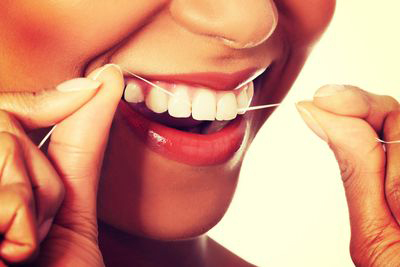Oral health, to most people, is synonymous with a set of pearly white teeth, and nothing more. While we are obsessed with a sparkling smile and a better self-image that inevitably comes with it, we tend to miss out on the larger picture of the synergic relationship between oral health and overall health of the body.
“Oral health is a mirror which reflects the body's overall health,” says Dr Prafull Sabadra, prosthodontist, Dr Sabadra's Dentistry Centre, Mumbai. “The mouth is the most used part of the body,” he adds, “and also the most neglected.” The internal body communicates with the external world through a number of openings in the body, of which the oral cavity is a port of entry for most infections.
Many people do not know that periodontal diseases, commonly known as gum diseases, not only lead to tooth loss, but many other serious health issues. “So, they need to be dealt with seriously. There are countless researches that associate gum diseases with numerous health ailments including cardiovascular diseases, diabetes, dementia, rheumatoid arthritis, premature birth, kidney disease and oral cancer, says Dr Akanksha Grover, Axiss Dental, New Delhi. And if you think digestion happens only in the stomach, think again. Digestion starts in the mouth when we chew our food, well before it reaches the stomach. So if your teeth are not in good condition it can often lead to digestive problems and nutritional deficiencies, says Dr Mahesh Lalwani, consultant dental surgeon, Jaslok Hospital, Mumbai.
House of bacteria
Ever wondered who lives inside your mouth? Research has identified over 700 bacterial species in the oral cavity. Slimy gums and dark crevices between the teeth are perfect dwelling places for billions of bacteria and other microorganisms. While not all of them are troublemakers, some of these, if not cleaned regularly, can cause bleeding gum tissue and other oral diseases. Damaged gums allow bacteria to flow into the bloodstream and travel to different parts of the body. “Not many people know that several species of bacteria that cause gum diseases have been found in the plaque in the arteries of the heart,” says Dr Prafull. This plaque can lead to heart attack.

Dental plaque is another oral health problem that results from poor oral hygiene. It is usually a yellow coating that develops when bacteria attach themselves to the surfaces of the teeth. Plaque is caused when food particles are frequently left on the teeth. These bacteria ferment food and the resulting acidic productions can cause cavities in the teeth and tooth decay. Plaque also develops on the tooth roots, weakening the gums and the bone supporting the tooth. Studies have shown that bacteria from the biofilm on the teeth may reach the respiratory tract and trigger pulmonary infections like pneumonia.
Link with diseases
Gastric disorders and peptic ulcers in the stomach, caused by H. pylori bacterium are common these days. These too have a hidden link to oral health, say experts. “The oral cavity can serve as a reservoir of the H. pylori bacteria,” says Dr Mahesh. “Antacids are prescribed for patients who suffer from H. pylori infections. In many cases, however, doctors refer these patients to a dentist to check for an oral infection that might have led to this condition,” he explains.
Diabetes and gum diseases are also inter-linked. According to Dr Akanksha, many a time, swollen gums lead the patient to a dentist. However, ultimately it turns out to be a case of undiagnosed diabetes. In today’s world where two out of five people are diabetic, taking care of your gums is essential. If you are diabetic and your gums are not strong enough, then you will not be eating well, leading to a cycle of worsening sugar levels, explains the doctor. Headaches, neckaches, muscle soreness, etc. can also be signs of a dental problem. Therefore, as Dr Prafull puts it—if you have good oral health, your overall health is likely to be much better.
Oral care tips
Your teeth are meant to last you a lifetime and this can be accomplished only through regular dental care and oral hygiene. Here are a few tips to keep those teeth in good shape:
1.Follow a healthy diet: Health of our teeth and gums are largely governed by our eating habits and food choices. Enrich your diet with nutritious food, rather than fast food and carbonated drinks. Combination of acid and sugar is a disaster formula for teeth, say experts, and hence soft drinks should be a strict no-no as they contain carbonic acid and sugar.
2.Stay away from sugar: Sugar is the biggest culprit in most oral health problems including plaque and cavities. Bacteria in dental plaque convert sugar into acids which wear off the tooth enamel.
3.Brush at least twice a day: Rinse your mouth and brush your teeth after meals. Most people brush their teeth for oral gratification, only till the flavour of the toothpaste remains, i.e., for about 12-15 seconds. For healthy teeth, brush your teeth at least for two minutes.
4.Do not be tough on your teeth: Use a toothbrush with soft bristles as these can slide between your teeth and clean better. Soft bristles are kinder on your gums.
5.Floss regularly: Though this is a very important step towards dental hygiene, Indians are yet to catch up with the culture of flossing. Brushing does only about 40-45 per cent of the cleaning. Dental floss is the thin soft cord that is used to gently remove food from between the teeth. It cleans up areas of the mouth which cannot be reached with a toothbrush, no matter how flexible and fine. Regular flossing once a day is a very effective way of removing plaque and preventing tooth loss and gum disease.
6.Massage your gums: This stimulates blood flow to the gums, rejuvenating them and keeping them healthy.
7.Chew sugar-free gum: Chewing sugar-free gum after a meal also helps in keeping the mouth clean. It increases the flow of saliva in the mouth, which washes away bacteria and neutralises acid content.
Ouch! That hurts

You have been eagerly waiting to indulge in a scoop of ice-cream or dig your teeth into that succulent gulab jamun, but right when you are about to do so, a sharp pain strikes your tooth and plays spoilsport. Tooth sensitivity is this sudden pain or discomfort triggered by hot, cold, sweet or sour food items. This is due to gradual exposure of dentin—the part of the tooth that lies beneath the enamel. Within the dentin are tubules that carry nerves. These nerves are branches from the nerve in the pulp at the centre of the tooth. So, when dentin is exposed, these nerve branches are stimulated, triggering a sharp pain.
Sensitive teeth may be due to following reasons:
As we grow older, teeth enamel begins to wear off, thereby, exposing the dentin and leading to sensitive teeth. Receding gums, particularly in older adults, can also be a cause.
Cavities can leave the enamel eroded and expose the dentin. Advanced cavities can result in pulpitis or pulpal hypersensitivity characterised by inflammation of the tooth pulp (nerves, blood vessels and connective tissue that make up the centre of the tooth).
In case of exposed enamel or receding gums, desensitising toothpastes can be used to ease sensitivity of teeth. These toothpastes form a coating on the teeth and protect the nerve endings. If sensitivity arises due to cavities, consult a dentist to get the cavities filled.
Regular dental check-up and a healthy diet can play an important role in checking sensitive teeth. Also keep in mind not to brush your teeth too hard or use hard-bristled toothbrushes. Teeth sensitivity is on a rise due to change in dietary habits, say doctors. Packaged food loaded with preservatives, sugar and acids do your teeth more harm than good.







